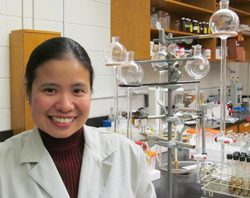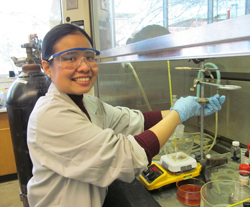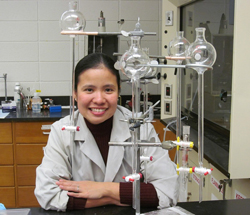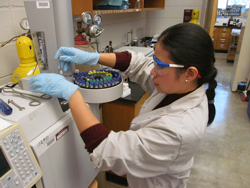Patrisha J. Pham-Bugayong
Sigma Xi members can be found across disciplines and fields of academia, government and industry. Each month in Sigma Xi Today, we like to take the time to highlight a different "Fellow Companion," to learn more about their work and what the honor of induction into Sigma Xi has meant for their career.
Tell us about your educational background including your doctoral research, if applicable.
 I graduated from the University of the Philippines, Los Baños Campus, with a Bachelor's degree in chemistry. Wanting to pursue further studies, I applied to study chemistry at Mississippi State University, where I worked with Dr. Tingyu Li, who also currently works with the National Science Foundation (NSF). My doctoral work focused on innovative separation methods, which involved ionic liquids immobilized on support for separation of fatty acids, as well as the use of proline, an amino acid, as chiral stationary phase selector. Currently, I am working as a Postdoctoral Researcher for the Renewable Fuels and Chemicals Laboratory at the Dave C. Swalm School of Chemical Engineering at Mississippi State University.
I graduated from the University of the Philippines, Los Baños Campus, with a Bachelor's degree in chemistry. Wanting to pursue further studies, I applied to study chemistry at Mississippi State University, where I worked with Dr. Tingyu Li, who also currently works with the National Science Foundation (NSF). My doctoral work focused on innovative separation methods, which involved ionic liquids immobilized on support for separation of fatty acids, as well as the use of proline, an amino acid, as chiral stationary phase selector. Currently, I am working as a Postdoctoral Researcher for the Renewable Fuels and Chemicals Laboratory at the Dave C. Swalm School of Chemical Engineering at Mississippi State University.
Do you have a particular teacher or professor who inspired your love of science? Why?
I've always loved science. My parents, both of whom are scientists, were my first teachers and truly have inspired me. In graduate school, a particular professor, Dr. Charles U. Pittman, inspired my learning even more. His love for science is present in everything that he does. In every way and in every opportunity, he shares with his students a multitude of interesting facts from his own readings and delivers his knowledge enthusiastically. In turn, it makes me eager to learn or discover something new.
What is the focus of your current research?
 My current research work focuses on developing specialty or value-added products from activated sludge. Our research group is actively working on activated sludge as a main feedstock and converting it to biodiesel. Activated sludge is a solid or semisolid byproduct of the biological treatment of wastewater. Our group has recognized that although we can produce biodiesel from this feedstock, there's still an array of other materials that can be harvested, synthesized and developed from this material. The beauty of our work lies in the fact that one's perspective on sludge can change and suddenly, something that's long been considered waste actually has value after all.
My current research work focuses on developing specialty or value-added products from activated sludge. Our research group is actively working on activated sludge as a main feedstock and converting it to biodiesel. Activated sludge is a solid or semisolid byproduct of the biological treatment of wastewater. Our group has recognized that although we can produce biodiesel from this feedstock, there's still an array of other materials that can be harvested, synthesized and developed from this material. The beauty of our work lies in the fact that one's perspective on sludge can change and suddenly, something that's long been considered waste actually has value after all.
Tell us about something we might see in our daily lives that directly correlates to your work.
Every day we encounter news in all forms of media about the worldwide oil price increase. The United States has recognized that by reducing its demand for oil, it can become more resilient to oil price shocks. The U.S. has numerous options for further reducing its oil demand, including additional tightening of fuel economy standards and shifting to alternative fuels. Our research belongs to a small portion of this alternative fuels or renewable energy area that encompasses biofuels, specifically biodiesel.
Give us an example of how multi-disciplinary research directly contributed to your work.
Due to the complexity of the activated sludge material we're working on, all fields and disciplines contribute tremendously to understanding its nature and potential. From chemistry, which identifies all the possible substances present and what can be developed; to microbiology, which helps understand the microbial community of the sludge through analyses and genetic profiling. There's also chemical engineering, which does the scale up of process reactions with practicality in mind, and even business and economics, which helps us ensure that our contributions will, in the long run, be profitable. Without collaboration and profitability, everyone goes back to the drawing board.
activated sludge material we're working on, all fields and disciplines contribute tremendously to understanding its nature and potential. From chemistry, which identifies all the possible substances present and what can be developed; to microbiology, which helps understand the microbial community of the sludge through analyses and genetic profiling. There's also chemical engineering, which does the scale up of process reactions with practicality in mind, and even business and economics, which helps us ensure that our contributions will, in the long run, be profitable. Without collaboration and profitability, everyone goes back to the drawing board.
What are your thoughts on the future of STEM education?
 Young people nowadays are reluctant to enter into a STEM-related field. It seems to me that they are reluctant because they find it too challenging, they don't know anything about it, or haven't been exposed enough to it to spark a personal interest. Students think this way because they are not exposed to enough teachers with a passion for STEM fields. We need to retain STEM talent first in teachers to ensure that it is also retained in education. I believe further incentives from both government and the private sector would allow STEM talent to stay in schools as educators. Better teachers, better education, better students.
Young people nowadays are reluctant to enter into a STEM-related field. It seems to me that they are reluctant because they find it too challenging, they don't know anything about it, or haven't been exposed enough to it to spark a personal interest. Students think this way because they are not exposed to enough teachers with a passion for STEM fields. We need to retain STEM talent first in teachers to ensure that it is also retained in education. I believe further incentives from both government and the private sector would allow STEM talent to stay in schools as educators. Better teachers, better education, better students.
Describe the patent/publishing experience—were there any bumps along the way for you?
In terms of publication, our work is pretty original. Thus, to justify the scientific content is not really difficult. The challenge of publishing lies more in proving that what we're doing actually has value and potential for success in the long run.
What has the honor of induction into Sigma Xi meant to you?
Induction into Sigma Xi has inspired me to work even harder and contribute more both for the scientific community and my fellow researchers in similar fields. It has given me a sense of "belonging" and I feel I can finally call myself a scientist.
Has Sigma Xi helped further your career? If so, how? If you haven’t started your career yet, how do you believe Sigma Xi will serve you in the future?
My membership in Sigma Xi has introduced me to contacts within the same research area, as well as to other scientists who work in fields that are not related to my own. Belonging to the Society has broadened my network of scientists and researchers. I am sure that my affiliation with Sigma Xi will help me positively in my career.
What books are you currently reading for pleasure?
Three Cups of Tea: One Man's Mission to Promote Peace One School at a Time by Greg Mortenson
When you're not working on your research, what do you do in your free time?
When I am not working, I just like to spend time with family and friends. Cook something special. When I have more free time, I play tennis, run or work on arts and crafts.
What’s your favorite movie?
We have the tendency to choose movies with subjects opposite of those with which we work. Since 95% of research is cognitive, my favorite movie is highly emotional, The Notebook. Let me throw in the classic Sound of Music as well.
What is your favorite motto?
"To look is one thing, to see what you look at is another, to understand what you see is a third, to learn what you understand is still something else, to act on what you learn is all that really matters."- Winston Churchill
What advice would you give a young researcher just starting out in your field?
My advice for young researchers is not to get disheartened easily because even in failure there is opportunity.
Sigma Xi just celebrated its 125th year. What advances do you see in your field of research over the next 125 years?
Demand for renewable fuel has an increasing trend. Thinking positively ahead 125 years from now, I see research in this area surge and becoming parallel with petroleum research. Also, most, if not all of the wastewater treatment facilities have the capability of producing renewable fuel and powering their own communities.